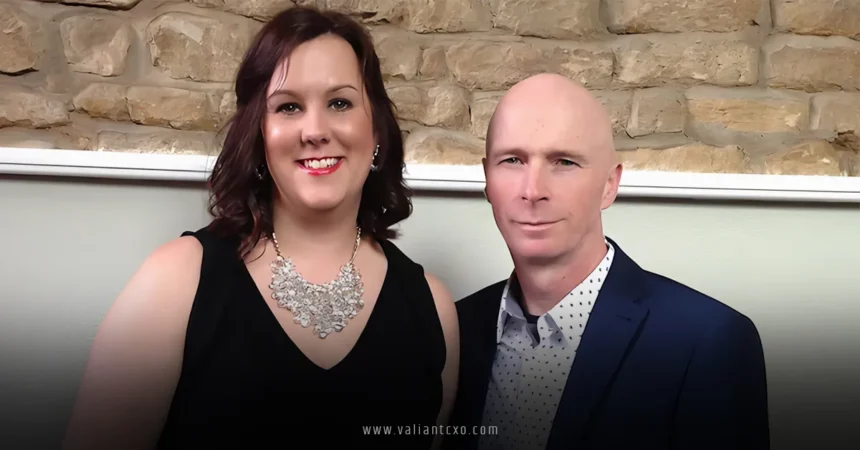Lucy Connolly, a name that has sparked heated debates across the UK, became a focal point in discussions about free speech, social media responsibility, and the consequences of online actions. Her story, rooted in a single inflammatory tweet, has raised questions about where the line is drawn between expression and incitement. Who is Lucy Connolly, and how did one moment of anger lead to a 31-month prison sentence? Let’s dive into her story, exploring the events, the fallout, and what it means for the rest of us.
Who Is Lucy Connolly?
Lucy Connolly, a 41-year-old former childminder from Northampton, UK, was an ordinary woman before her name became synonymous with a controversial legal case. Married to Raymond Connolly, a former Conservative councillor, she lived a quiet life, caring for children and navigating personal tragedies. The loss of her son, Harry, in 2011 left her with PTSD, a wound that shaped her emotional response to later events. But it was a single post on X that thrust Lucy Connolly into the spotlight, turning her into a symbol for both free speech advocates and those demanding accountability for hate speech.
A Mother and Childminder
Before the controversy, Lucy Connolly was known for her work as a childminder, caring for children of diverse backgrounds. Parents trusted her, and kids loved her. She built a reputation as a nurturing figure, which makes her later actions all the more shocking. How could someone so caring post something so inflammatory? Her supporters argue her tweet was a moment of grief-fueled rage, not a reflection of her character.
Personal Tragedy and Emotional Context
The loss of her son Harry at 19 months old was a defining moment for Lucy Connolly. The trauma of losing a child to poor NHS care left deep scars. When news broke of the tragic Southport killings in July 2024, where three young girls lost their lives, it hit her hard. The emotional weight of her own loss likely fueled her impulsive tweet, but does personal pain excuse dangerous rhetoric?
The Tweet That Changed Everything
On July 29, 2024, Lucy Connolly posted a 51-word message on X that would alter her life forever. Prompted by false rumors that an illegal immigrant was responsible for the Southport killings, she wrote: “Mass deportation now, set fire to all the f***ing hotels full of the bastards for all I care… If that makes me racist, so be it.” The tweet, viewed 310,000 times and reposted 940 times before she deleted it, ignited a firestorm. But what made this post so dangerous, and why did it lead to such severe consequences?
The Southport Killings and Misinformation
The Southport tragedy, where three girls were killed at a dance workshop, sent shockwaves through the UK. False rumors spread like wildfire, claiming the perpetrator was a Muslim asylum seeker. Lucy Connolly, like many others, was caught up in this wave of misinformation. Her tweet, posted just hours after the tragedy, tapped into a volatile atmosphere. But was her reaction a one-off mistake or part of a pattern?
The Legal Consequences for Lucy Connolly
Lucy Connolly’s tweet wasn’t just a fleeting outburst—it was deemed incitement to racial hatred under UK law. In October 2024, she was sentenced to 31 months in prison at Birmingham Crown Court. Judge Melbourne Inman KC emphasized the need to “punish and deter,” noting the tweet’s potential to incite violence during a time of nationwide unrest. Connolly pleaded guilty, expecting a lighter sentence, but the court’s decision was firm. Was the punishment proportionate, or did it cross a line?
The Free Speech Debate Sparked by Lucy Connolly
Lucy Connolly’s case has become a lightning rod for debates about free speech versus hate speech. Supporters, including the Free Speech Union, argue her 31-month sentence was excessive, painting her as a victim of an overzealous justice system. Critics, however, see her punishment as justified, given the potential for her words to fuel real-world violence. So, where do we draw the line?
Free Speech Union’s Support
The Free Speech Union, founded by Lord Toby Young, funded Lucy Connolly’s appeal, arguing her sentence was disproportionate. Legal officer Stephen O’Grady highlighted concerns about “police overreach” and the chilling effect on online expression. They point to cases like Mark Heath, a former prison officer acquitted for similar posts, to argue that Connolly’s punishment was unusually harsh. Does her case signal a broader crackdown on free speech?
Critics’ Perspective on Accountability
On the other side, voices like writer Shola Mos-Shogbamimu argue that Lucy Connolly’s tweet wasn’t just offensive—it was dangerous. “She didn’t tweet something that hurt someone’s feelings; she tweeted saying someone should die,” Mos-Shogbamimu said. Her call to burn hotels housing asylum seekers came during a period of riots and attacks on immigration hostels. Can free speech exist without accountability when words risk inciting violence?
The Role of Social Media in Lucy Connolly’s Case
Social media platforms like X amplify voices, for better or worse. Lucy Connolly’s tweet reached 310,000 people in just three and a half hours, showing the power and peril of online platforms. The algorithms that boosted her post didn’t care about context—they just spread it. How does social media shape these controversies, and what responsibility do platforms bear?
The Amplification Effect
A single tweet from Lucy Connolly, with her 9,000 followers, became a viral lightning bolt. Social media’s ability to amplify messages means one moment of anger can reach millions. The retweets and screenshots kept her words alive even after she deleted them. It’s like throwing a match into a dry forest—once it catches, there’s no stopping it.
Platform Responsibility
X, like other platforms, faces scrutiny for how it handles inflammatory content. While Connolly deleted her tweet, the damage was done. Should platforms intervene faster to remove harmful posts, or does that risk censoring free speech? The debate rages on, with Lucy Connolly’s case as a prime example of the stakes involved.
The Impact on Lucy Connolly’s Family
Beyond the legal and public debate, Lucy Connolly’s imprisonment has taken a toll on her family. Her husband, Raymond, a former councillor, has stood by her, describing the “284 days of separation” as devastating, especially for their 12-year-old daughter. The ripple effects of one tweet have reshaped their lives. How does a family cope with such public and personal turmoil?
Raymond Connolly’s Response
Raymond Connolly, who lost his council seat in 2025, has been vocal about his wife’s case. He insists Lucy Connolly is “not a racist” and highlights her work with children of African and Asian heritage. His heartbreak is palpable, but his refusal to resign during the scandal drew criticism. Can a public figure separate their personal and professional lives in such a storm?
The Emotional Toll on Their Daughter
Lucy Connolly’s daughter has struggled with her mother’s absence, showing behavioral issues at school. The loss of a primary caregiver, compounded by public scrutiny, has left deep marks. It’s a stark reminder that online actions don’t just affect the poster—they ripple out to loved ones.
Lessons from Lucy Connolly’s Case
What can we learn from Lucy Connolly’s story? It’s a cautionary tale about the power of words, the volatility of social media, and the fine line between free speech and hate speech. Her case forces us to ask: How do we balance personal expression with public safety? And what role do our emotions play in shaping what we say online?
The Power of Words
Words aren’t just air—they’re weapons or bridges, depending on how you wield them. Lucy Connolly’s tweet, born from anger and grief, became a weapon that landed her in prison. It’s a reminder to pause and think before hitting “post.” How often do we let emotions override reason in the heat of the moment?
Navigating Social Media Responsibly
Social media is a megaphone, and Lucy Connolly’s case shows what happens when it’s used recklessly. Before posting, ask yourself: Could this hurt someone? Could it be misinterpreted? Taking a moment to reflect can save you from a world of trouble.
The Broader Implications for Society
Lucy Connolly’s case isn’t just about one woman—it’s about the kind of society we want to live in. Do we prioritize free expression, even when it’s ugly, or do we clamp down to protect public safety? Her story challenges us to find a balance that respects both individual rights and collective well-being.
The UK’s Approach to Hate Speech
The UK’s strict laws on incitement to racial hatred, under the Public Order Act 1986, aim to prevent violence and division. Lucy Connolly’s sentence reflects this approach, but critics argue it risks chilling free speech. Other countries, like the US, have looser restrictions—does that make them freer or more dangerous?
The Global Context
Lucy Connolly’s case has drawn attention beyond the UK, with figures like Elon Musk and former US officials weighing in. It highlights a global tension: how do we regulate online speech in an interconnected world? Her story is a microcosm of a larger battle over the future of digital communication.
Conclusion
Lucy Connolly’s journey from a Northampton childminder to a symbol of the free speech debate is a stark reminder of the power of words in the digital age. Her tweet, fueled by grief and misinformation, sparked a firestorm that led to a 31-month prison sentence, family hardship, and a polarized public. While some see her as a victim of an overreaching justice system, others view her punishment as a necessary stand against hate speech. Her case challenges us to think critically about what we say online, how platforms amplify our words, and where the line lies between free speech and incitement. As we navigate this complex terrain, let’s pause before we post, knowing that one moment of anger can change everything. What will you do the next time you’re tempted to vent online?
FAQs About Lucy Connolly
Who is Lucy Connolly, and why was she jailed?
Lucy Connolly is a former childminder from Northampton, UK, jailed for 31 months in October 2024 for inciting racial hatred. Her tweet, posted after the Southport killings, called for burning hotels housing asylum seekers, sparking widespread controversy.
What was the content of Lucy Connolly’s controversial tweet?
Lucy Connolly posted a 51-word tweet on July 29, 2024, urging “mass deportation” and to “set fire to all the f***ing hotels full of the bastards,” referring to asylum seekers. She ended with, “If that makes me racist, so be it.”
How has Lucy Connolly’s case affected the free speech debate?
Her case has polarized opinions, with the Free Speech Union arguing her sentence was excessive, while critics like Shola Mos-Shogbamimu say it was justified due to the potential for violence. It raises questions about balancing free speech and accountability.
What impact did Lucy Connolly’s imprisonment have on her family?
Lucy Connolly’s 31-month sentence has strained her family, with her husband, Raymond, describing the emotional toll on their 12-year-old daughter, who has shown behavioral issues. Raymond insists Lucy is not racist, citing her work with diverse children.
Where can I learn more about Lucy Connolly’s case?
For deeper insights, check out credible sources like the BBC News for detailed reporting, The Guardian for legal context, and The Spectator for commentary on the free speech debate.
Similar Articles:valiantcxo.com


